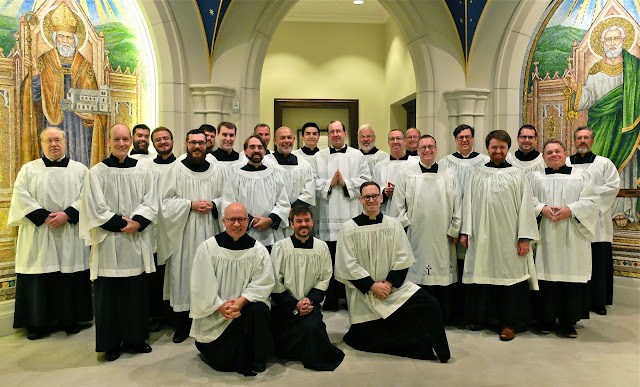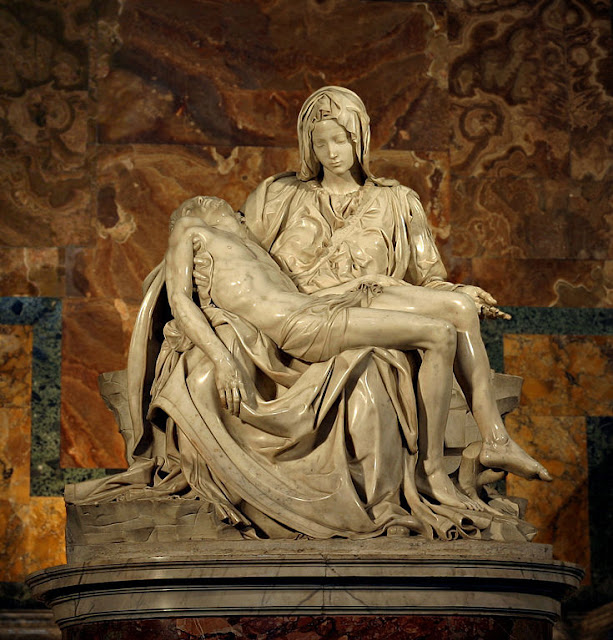Michael E. Lawrence on Beauty In The Liturgy
ON THE IMPORTANCE OF BEAUTY IN THE LITURGY
by Michael E. Lawrence
Originally published March 29, 2008 at the NLM.
http://www.newliturgicalmovement.org/2008/03/on-importance-of-beauty-in-liturgy.html#.WqnmayMrLpQ
by Michael E. Lawrence
Originally published March 29, 2008 at the NLM.
http://www.newliturgicalmovement.org/2008/03/on-importance-of-beauty-in-liturgy.html#.WqnmayMrLpQ
Conventional wisdom has it that beauty is skin deep. There is nothing substantial to it; beauty is all vanity. This little kernel perhaps sums up best a puritan attitude which disregards beauty in general, whether in the form of a person, in nature, or in the arts, which are often considered mere extravagance.
This attitude, however, is not in keeping with the millenia-old Western tradition. The Greek philosophers waxed eloquent about beauty, and so have many Christian theologians. The Medievals said that beauty is comprised of unity, variety, and goodness of form. This is echoed in the traditional definition of art as “a thing well-made.” More than that, however, beauty was defined as that which “brought delight to the senses,” as St. Thomas Aquinas said. Sometimes, without any time to think about how “well-made” a thing is, we are simply dazzled by its beauty. In Medieval times this was considered to be particularly true with respect to colors.
In spite of all this, beauty was always tied in with other considerations, namely goodness, truth, and unity. The aesthete’s sole concern with “prettiness” was not well-regarded. Beauty was in many ways based upon virtue: an object was considered beautiful if it was well-made; and a person who was ugly, e.g. a leper, was considered to be somehow un-virtuous (a most unfortunate byproduct of a very beautiful philosophy).
St. Augustine of Hippo said that God reaches people through four means: 1) goodness; 2) truth; 3) beauty; and 4) unity. Everyone is drawn to God via one of these things, or by some combination of them. How are men drawn to God through beauty? Pope Benedict XVI discusses the power of beauty, for instance a Bach cantata or an icon, to draw us in and bring us into contact with the truth. One could perhaps say that beauty “woos” us so that we will come closer, and by coming closer, we encounter God. Isn’t this true when a lover meets his beloved for the first time? Though many do not believe in love at first sight, it is nevertheless this first glance which draws each person to the other. Thereafter they get to know each other and get to see not only the other’s “skin deep” beauty, but also the beauty that flows from their goodness, their honesty (“truth”), and their integrity (“unity”).
All of these principles apply to the liturgy. The beauty of the liturgy, which is manifested in architecture, artwork, vesture, music, etc., draws us in closer, so that we may more fully experience an encounter with Christ and see His Beauty, even if it is only a ray of it. This beauty is one of the things which helps us to bring the infinite into definite form; it brings God within the realm of our limited human senses, so that we cannot only think about Him but truly experience His presence. (In this way, beauty is “sacramental,” just like the Eucharist.) Then we will experience His goodness, truth, and unity in ways that make theological discourse look like “so much straw.”
.jpg)





Comments
Post a Comment
Your comments will be appreciated and posted if 1) they are on topic and 2) preserve decorum.
Stand by your word.